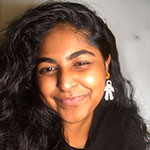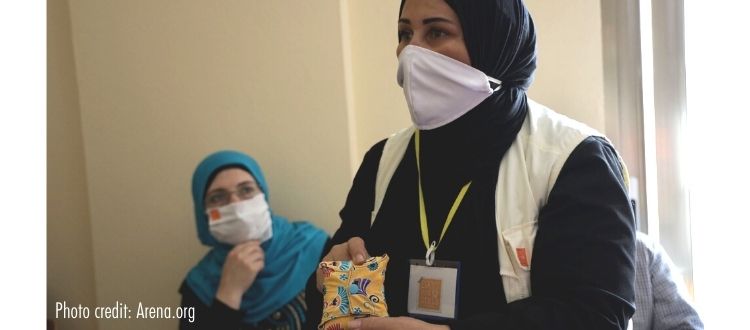The Prevalence of Period Poverty in Refugee Camps
 |
| Mrittika Howlader WVE Fellow |
At the end of 2020, more than 80 million people worldwide were forcibly displaced from their places of sanctuary and comfort due to violence, persecution, and human rights violations. This absurdly massive number does not even begin to cover the terrors that occurred throughout 2021, such as the Israeli attacks on Gaza that displaced thousands of Palestinians and then the thousands of Afghans that sought refuge in neighboring countries after the Taliban seized control of the government. Of the 80 million, about 6 million are refugees settled in camps that, more often than not, offer little to no peace of mind. Girls and women make up around 50% of this population, i.e., 3 million. Despite this statistic, women are still experiencing gender-based oppression in these camps that is often deliberate and in favor of the patriarchies that exist all around the world. Along with the burdens that both men and women must carry in order to survive whilst in these camps, like food and shelter, many women have an additional strain placed on them –– caring for their periods.
In 2019, it was reported by the United Nations High Commissioner for Refugees (UNHCR) that only about 55% of the girls in camps had their menstrual needs met with the right products, such as tampons and pads, and only 37% had satisfactory access to underwear. This inaccessibility adds a completely unnecessary anxiety associated with periods that can have a detrimental effect on other aspects of menstruators’ lives, such as their education and mental health. When health and education are undervalued or under-resourced –– especially during adolescence –– the results can be devastating and lasting. Moreover, the lack of access to period products leaves some menstruating refugees to use unhygienic alternatives, or to reuse disposable products, which leads to even more physical health risks. COVID-19 has only further aggravated matters; more than 70% of WASH (Water, Sanitation and Hygiene) professionals have noted that access and distribution of supplies for the camps have been blocked and impeded during the pandemic. And a number of businesses selling menstrual products either closed due to lockdowns or hiked up their prices because demand was up.
To complicate this issue further is the stigmatization of periods and what happens to a person’s well-being when those negative implications are internalized. From a young age, many women are told to be ashamed and embarrassed about their menstruating bodies. The act of menstruating is often characterized to be ‘dirty’ and ‘disgusting,’ despite it being a natural part of a person’s reproductive health. Due to the stigma that surrounds periods, many menstruators in refugee camps go to extreme measures to hide the fact that they are on their periods; some will bury their used pads and tampons multiple feet underground, others will only dispose of their used products in obscure black bag — but the method that perhaps puts them in the most danger includes traveling very far during the nighttime to isolated areas, such as forests, to change their underwear. One could easily see how risky this situation is, especially with the rampant rape culture in many of the nations that hold refugee camps. Not to mention the gross abuse of power by the residing military members settled in those camps. In essence, women are forced to become uncomfortable whilst trying to make men more comfortable. When asked about these perilous conditions, Meervat Ali, a 15-year-old Syrian girl living in a refugee camp in Greece, responds with “’I thought it would be like paradise, but here I feel like a hostage.’” What are the long-term and short-term consequences of these actions that punish people for taking care of their health issues?
Working Towards Solutions
While this sort of marginalization has been happening for decades, there is much to be hopeful about. Just one of the stories that I’d like to highlight is that of the work of an organization named Anera. Anera provides humanitarian assistance through the mobilization of resources specifically for the refugees settled in Palestine, Lebanon, and Jordan. Most of all, Anera makes a conscious effort to address gaps in the menstrual field. Not only do they partner up with vital organizations who send menstrual care products (some are reusable and can last for up to three years) that Anera then distributes to refugee girls who otherwise could not afford or gain access to these, but they also have implemented programs aiming to educate young girls on how to break the menstrual taboo through awareness and education. There are plenty of organizations like Anera that are doing this amazing work, like Freedom4Girls and Days for Girls (DfG). Their hard work is a step towards justice for refugee women and girls.
Nonetheless, complete liberation entails all hands on deck –– we need organizations and agencies all over the world finally and fully investing in menstrual products and reproductive health. The destigmatization of a topic that has such deep misogynistic roots needs to occur now. Period.
Having led two of WVE’s Our Stories, Our Flow workshops, I have seen the impact of holding these vulnerable conversations about menstruation. It is so crucial to center our dialogue around liberating ourselves from the stigmas and burdens of our patriarchy because only then can we really challenge how we critically evaluate and reflect on the way we think and talk about our periods. These discussions are especially cathartic for me because I have the wonderful opportunity to unpack some buried and subconscious trauma that I was previously completely oblivious about. What’s more, I listen to folks form a mutual bond over shared experiences that once only used to carry shame and guilt. I think it is profoundly inspiring how incredible moments like these create fuel for mobilization and activism on a local and even a global level.
So, here’s how you can get involved in the action for change! Due to the Afghanistan refugee crisis, many organizations are looking for donations, such as menstrual products. See if your city/state is welcoming refugees, and use this donation guide to purchase safe and healthy products people may need.





